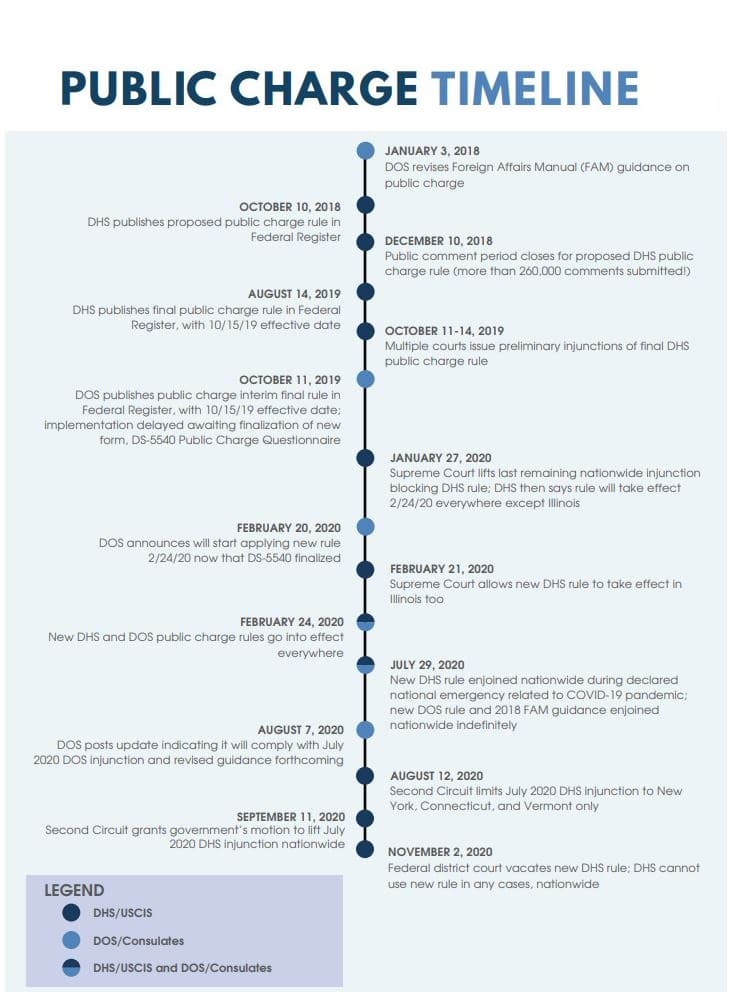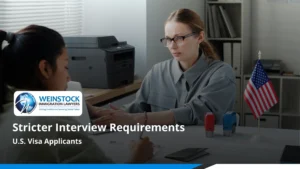Public Charge Rule Cancellation – I-944 is no longer required
“Public charge” is a ground of inadmissibility. Grounds of inadmissibility are reasons that a person could be denied a green card, visa, or admission into the United States. In deciding whether to grant some applicants a green card or a visa, an immigration officer must decide whether that person is likely to become dependent on certain government benefits in the future, which would make them a “public charge.” It is not a test that applies to everyone, not even to all those applying for green cards.
NEWS UPDATE: The government CANNOT apply the new public charge rules anywhere in the United States or abroad.
On November 2, 2020, a federal district court vacated the new Department of Homeland Security (DHS) public charge rule. This means that as of November 2, 2020, U.S. Citizenship and Immigration Services (USCIS) cannot apply the new rule or require the use of the new Form I-944.
The Department of State is also blocked (since July 29, 2020) from applying the new public charge rule in cases decided at consulates and embassies. Embassies and consulates have not been open for routine processing during much of the pandemic. As consulates begin to process cases, they cannot apply the enjoined DOS rule related to public charge, the health insurance proclamation from October 2019, or prior guidance issued in January 2018 related to public charge.
What does this mean, for those who filed Form I-944 when this rule was in effect:
I-944 is no longer required. For those who filed Form I-944 when this rule was in effect, there is nothing for you to do at this time, as the form and applications will accompany your case until your green card is adjudicated
BACKGROUND: In late 2019, the government issued two new rules related to public charge: one for cases decided in the United States, and the other for cases decided at U.S. consulates and embassies abroad. After litigation initially blocked the rule for cases decided in the United States, both rules took effect on February 24, 2020. On July 29, 2020, both rules were blocked by two new court orders. In August, the Second Circuit Court of Appeals first limited the injunction for cases decided by USCIS to New York, Vermont, and Connecticut. In September, the Second Circuit Court of Appeals then lifted the injunction altogether, allowing USCIS to resume implementation of the new rule. USCIS resumed implementation in late September 2020 for all cases postmarked on or after February 24, 2020 (including some submitted over the summer without Form I-944). On November 2, 2020, a different federal district court decided that the new DHS rule violates the law. Thus, as of November 2, 2020, USCIS may not apply the new public charge rule nationwide. USCIS has not yet updated its website to reflect this latest decision.

Here are a few important points regarding public charge:
- Public charge does not apply to all immigrants. This law mainly impacts those seeking permanent resident status through family member petitions.
- Many immigrant categories are exempt from the public charge ground of inadmissibility, even if they might be applying for status or a green card. U visa holders, T visa holders, asylees, refugees, and many more categories are exempt.
- Public charge laws do not apply in the naturalization process, through which lawful permanent residents apply to become U.S. citizens.
COVID-19 and Public Charge: All noncitizens should get the care they need. U.S. Citizenship and Immigration Services (USCIS) has announced that getting testing and treatment for COVID-19 (including a vaccine if one becomes available) will not trigger the public charge. In its announcement, USCIS also indicated that it would take into account other factors in a person’s life due to the pandemic, such as job loss and a need for further benefits, that might impact a public charge decision.
Source: USCIS.com, Protecting Immigrant Families
Related posts

New Scrutiny on H‑1B and Skilled Worker Visas: How to Prepare
Summary H-1B visa holders and U.S. sponsoring employers are facing a new era of heightened immigration scrutiny. 2025 introduces stricter rules, higher fees, and increased

Stricter Interview Requirements for U.S. Visa Applicants – What You Must Know
Summary The U.S. visa interview process is set to undergo one of its most significant changes in recent years. Starting September 2, 2025, most nonimmigrant

What the Latest Visa Integrity Fee Means for Non‑Immigrant Applicants
Summary The U.S. government plans to introduce a new Visa Integrity Fee as early as fiscal year 2026. The fee is set at $250 per
